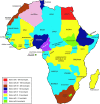Unlocking the hidden burden of epilepsy in Africa: Understanding the challenges and harnessing opportunities for improved care
- PMID: 37081998
- PMCID: PMC10111115
- DOI: 10.1002/hsr2.1220
Unlocking the hidden burden of epilepsy in Africa: Understanding the challenges and harnessing opportunities for improved care
Abstract
Background: Epilepsy is a common neurological disorder that affects many people in Africa, yet the burden of the disease is often hidden. The management of epilepsy in Africa is often inadequate due to a lack of awareness and education, limited access to diagnostic tools and treatments, inadequate coordination of care, and the stigma associated with the condition.
Method: A comprehensive literature review was conducted to gather information on the epidemiology, diagnosis, management, and outcomes of epilepsy in Africa. The review included studies from peer-reviewed journals, government reports, and gray literature.
Results: The review revealed a high burden of epilepsy in Africa. The studies also showed a significant gap in the availability and accessibility of diagnostic tools, antiepileptic drugs, and specialized therapies such as physical, occupational, and speech therapy. Additionally, the review found that cultural beliefs and practices, socioeconomic factors such as poverty and lack of access to healthcare, and the stigma associated with the condition, also pose significant challenges to managing epilepsy in Africa.
Conclusion: The study highlights the urgent need for improved epilepsy management in Africa. Additionally, the study calls for further research on epilepsy in Africa and collaboration between all stakeholders to improve the management of epilepsy in Africa.
Keywords: Africa; epilepsy; neurology.
© 2023 The Authors. Health Science Reports published by Wiley Periodicals LLC.
Figures
Similar articles
-
Navigating the journey of multiple sclerosis management in Africa, overcoming hurdles and harnessing opportunities: a review.Ann Med Surg (Lond). 2023 Apr 6;85(5):1774-1779. doi: 10.1097/MS9.0000000000000560. eCollection 2023 May. Ann Med Surg (Lond). 2023. PMID: 37228987 Free PMC article.
-
Diagnosis and Classification of Pediatric Epilepsy in Sub-Saharan Africa: A Comprehensive Review.J Clin Med. 2024 Oct 25;13(21):6396. doi: 10.3390/jcm13216396. J Clin Med. 2024. PMID: 39518535 Free PMC article. Review.
-
Healthcare provider perspectives regarding epilepsy care in Uganda.Epilepsy Behav. 2021 Jan;114(Pt B):107294. doi: 10.1016/j.yebeh.2020.107294. Epub 2020 Aug 3. Epilepsy Behav. 2021. PMID: 32763023
-
Perceptions about mental healthcare for people with epilepsy in Africa.Epilepsy Behav. 2022 Feb;127:108504. doi: 10.1016/j.yebeh.2021.108504. Epub 2021 Dec 23. Epilepsy Behav. 2022. PMID: 34954510
-
Review of epilepsy care in the Democratic Republic of the Congo.Epilepsia Open. 2024 Apr;9(2):467-474. doi: 10.1002/epi4.12904. Epub 2024 Jan 20. Epilepsia Open. 2024. PMID: 38243880 Free PMC article. Review.
Cited by
-
Prevalence of onchocerciasis and epilepsy in a Tanzanian region after a prolonged community-directed treatment with ivermectin.PLoS Negl Trop Dis. 2024 Sep 6;18(9):e0012470. doi: 10.1371/journal.pntd.0012470. eCollection 2024 Sep. PLoS Negl Trop Dis. 2024. PMID: 39241094 Free PMC article.
-
Epilepsy in Africa: a multifaceted perspective on diagnosis, treatment, and community support.Ann Med Surg (Lond). 2023 Nov 20;86(1):624-627. doi: 10.1097/MS9.0000000000001536. eCollection 2024 Jan. Ann Med Surg (Lond). 2023. PMID: 38222688 Free PMC article.
-
Evolving trends and burden of idiopathic epilepsy among children (0-14 years), 1990-2021: a systematic analysis for the Global Burden of Disease study 2021.Front Neurol. 2025 Mar 17;16:1548477. doi: 10.3389/fneur.2025.1548477. eCollection 2025. Front Neurol. 2025. PMID: 40166644 Free PMC article.
-
Epilepsy in low- to middle-income countries.Curr Opin Neurol. 2025 Apr 1;38(2):121-127. doi: 10.1097/WCO.0000000000001350. Epub 2025 Feb 10. Curr Opin Neurol. 2025. PMID: 39927414 Free PMC article. Review.
-
It Goes Beyond Anxiety: Experiences of Family Members and Caregivers of Epilepsy Care and Support.Neuropsychiatr Dis Treat. 2023 Dec 7;19:2757-2764. doi: 10.2147/NDT.S430337. eCollection 2023. Neuropsychiatr Dis Treat. 2023. PMID: 38090018 Free PMC article.
References
LinkOut - more resources
Full Text Sources
Medical
Miscellaneous


